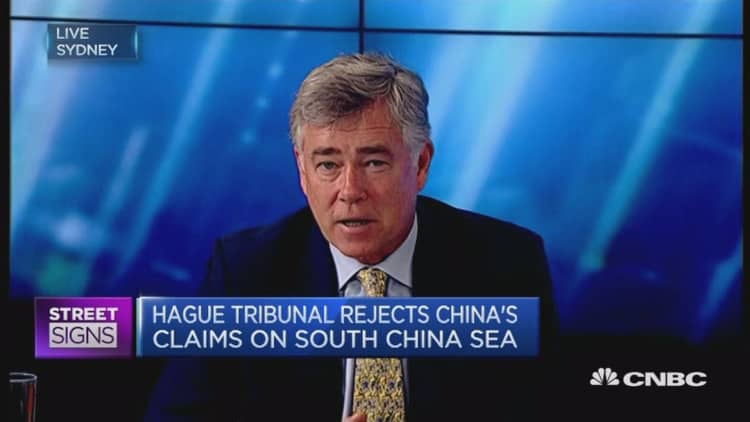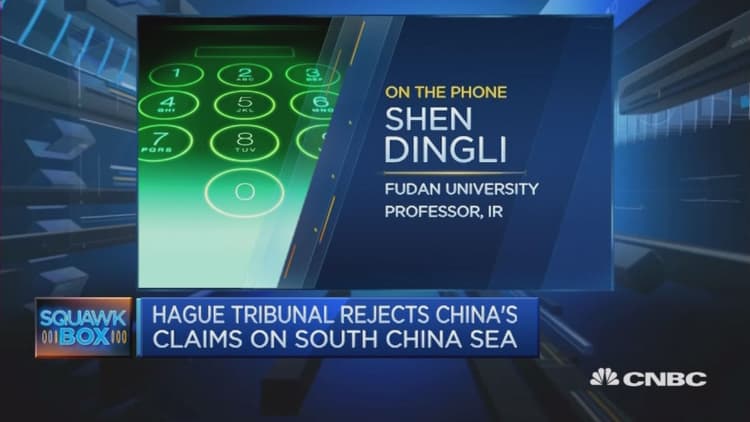

As China continues to ignore The Hague's ruling, strategists are warning of heightened tensions that could endanger Beijing's ties with Southeast Asia and hurt President Xi Jinping's international credibility.
Mainland officials have repeatedly publicized their disregard for The Hague's Tuesday court ruling, begging the question of what China's next move will be.
In an official statement, Beijing said it was ready for more diplomatic negotiations to resolve the matter, a move that Philippine President Rodrigo Duterte is also open to. But should diplomatic talks fail, of which there is a high probability of given China's stubborn position, Beijing may resort to military action.
On Wednesday, Vice Foreign Minister Liu Zhenmin said China has the right to set up an air defense zone in the South China Sea, but added that such a move depends on "the level of threats" the country faced. Meanwhile, Chinese ambassador to the U.S. Cui Tiankai said the case could intensify conflict and confrontation in the region, Reuters reported.
Experts largely expect China's response in the coming weeks to consist of strong diplomatic condemnation of the ruling combined with continued steady increase in its regional military presence.
"No state seeks conflict, but any sense that the decision is being used to roll-back China's territorial position will likely lead to an escalation in confrontations with the U.S. and its allies," explained Malcolm Jorgensen, senior lecturer at the University of Sydney.
He said direct negotiations with the Philippines and some form of the 2002 ASEAN provisional code of conduct, in which states agree to suspend sovereignty claims in favor of joint economic activity, remain the most plausible courses of action.
"The ruling won't change anything in the short-term ... China will continue its occupation of the islands and building them up," said James Nolt, senior fellow at World Policy Institute.
The South China Sea is a strategic zone for Southeast Asian nations given its operate profitable fishing and shipping businesses, so it's in the best interest of all parties to avoid the use of force, Nolt added.
That may reduce the possibility of significant escalation, but China's unwillingness to compromise means solutions are also unlikely, he said.
China's actions are being closely watched around the world. The world's number-two economy is trying to assert itself as a respected, global superpower and its international reputation has been bolstered by recent developments, including the International Monetary Fund's decision to make the renminbi as a reserve currency. But its aggressive dismissal of the tribunal decision could derail that progress.
"China is now a superpower, and superpowers are expected to behave in a certain way., they can't claim to be above the law, that would be a dangerous precedent," remarked Ashish Goyal, head of emerging markets equity at NN Investment Partners.
Goyal offered a more optimistic viewpoint, betting that closed-door talks between Beijing and Manila would see heightened geopolitical tensions subside.
"This won't get worse. It will calm down, not today because temperatures are high, but in two weeks from now, things will be much calmer."
China previously announced it may leave the U.N. Convention on the Law of the Sea should the court ruling oppose its claimed sovereignty, but academics don't think Beijing will act on that threat.
Regardless of whether or not China is part of the Convention, the ruling is still legally binding, explained Isaac Kardon, visiting scholar at New York University.
China can't appeal the decision in any international court so Beijing is essentially stuck with it and even if it were to withdraw, the conviction would still be valid, he said.
Credit rating agency Moody's offered a calm take on the matter, stating that Tuesday's ruling wasn't a catalyst for intensified geopolitical conflict.
"We do not expect the ruling to substantially affect either country's economy, budget or policy effectiveness," it said in a Wednesday statement, referring to the Philippines and China. "There may be actions or statements that stoke strains temporarily but these will not lead to a marked and protracted escalation of tensions."

